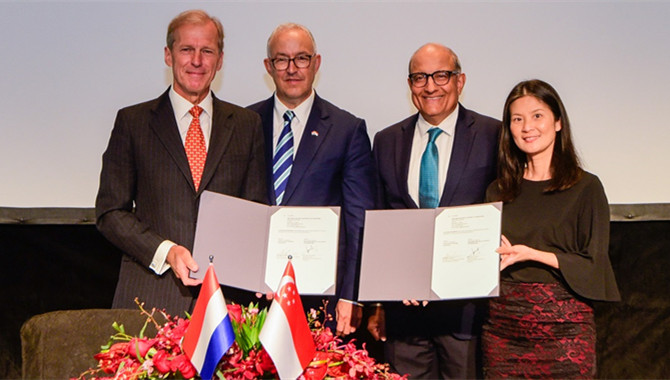
The Maritime and Port Authority of Singapore (MPA) and the Port of Rotterdam have signed a memorandum of understanding (MoU) to establish the world's longest Green and Digital Corridor to enable low and zero carbon shipping.
Signed by Ms. Quah Ley Hoon, Chief Executive of MPA, and Mr Allard Castelein, CEO of the Port of Rotterdam at the Marina Bay Sands Convention Centre on the sidelines of the biennial World Cities Summit, the MoU will bring together stakeholders across the supply chain to realise the first sustainable vessels sailing on the route by 2027. The signing was witnessed by Mr S Iswaran, Minister for Transport and Minister-in-Charge of Trade Relations, Singapore, and Mr Ahmed Aboutaleb, Mayor of Rotterdam.
Singapore and Rotterdam are among the largest bunkering ports in the world, making them vital links on the Asian-European shipping lanes. While international shipping currently uses largely marine gas oil (MGO) and low-sulphur fuel oil, sustainable alternatives such as biofuels, including biogases, are increasingly being made available. Other alternatives such as synthetic methane, hydrogen, and hydrogen-based fuels including ammonia and methanol are in various stages of R&D for future trials and deployment.
Each alternative fuel has its own challenges relating to costs, availability, safety, and restrictions in range due to lower energy density compared to fossil fuels. To tackle these challenges, the two port authorities agreed to bring together a broad coalition of shippers, fuel suppliers and other companies to collectively work on potential solutions.
Beyond alternative fuels, the MoU also aims to optimise maritime efficiency, safety, and the transparent flow of goods by creating a digital trade lane where relevant data, electronic documentation and standards are shared. This will facilitate the seamless movement of vessels and cargo, and optimise just-in-time arrival of vessels from port to port.
The port authorities will work with the Global Centre for Maritime Decarbonisation and the Mærsk Mc-Kinney Møller Center for Zero-Carbon Shipping as action partners[1], as well as other industry partners across the supply chain, including bp, CMA CGM, Digital Container Shipping Association, Maersk, MSC, Ocean Network Express, PSA International, and Shell for a start. This will enable the Green and Digital Corridor project to raise investment confidence, attract green financing, and kickstart joint bunkering pilots and trials for digitalisation and the use of low- and zero carbon fuels along the route.
Mr S Iswaran, Minister for Transport and Minister-in-Charge of Trade Relations, Singapore, said, “Decarbonising shipping is an urgent climate action priority, which requires the collective efforts of the entire maritime sector. As a trusted global maritime hub, Singapore contributes actively to IMO's efforts to make international shipping more sustainable, and global supply chains more resilient. This MoU with the Port of Rotterdam demonstrates how likeminded partners can work together to complement the efforts of the IMO. It will serve as a valuable platform to pilot ideas that can be scaled up for more sustainable international shipping.”
Allard Castelein, CEO of the Port of Rotterdam, said, “Shipping is among the most important industries to decarbonise, owing to its large international reach and volume, which continues to grow. By bringing together parties across the supply chain along one of the world's biggest trade lanes, we can enable carriers to switch to zero-carbon fuels and speed up the transition to more sustainable shipping”.
Ms. Quah Ley Hoon, Chief Executive of MPA, said, “This MoU further strengthens the strong partnership between Singapore and Rotterdam. It reaffirms Singapore's commitment towards facilitating a multi-fuel bunkering transition as part of the Maritime Singapore Decarbonisation Blueprint 2050, and accelerates our digitalisation efforts to optimise maritime efficiency and improve supply chain resilience. The pilot will complement efforts undertaken by the shipping industry, including partners such as Google Cloud, and the IMO to support decarbonisation and digitalisation transition for international shipping, as we work towards developing and scaling up green and digital solutions for wider adoption.”
The opinions expressed herein are the author's and not necessarily those of The Xinde Marine News.
Please Contact Us at:
media@xindemarine.com


 Ningbo Containerized Freight Index Weekly Commentar
Ningbo Containerized Freight Index Weekly Commentar  Ningbo Containerized Freight Index Weekly Commentar
Ningbo Containerized Freight Index Weekly Commentar  Ningbo Containerized Freight Index Weekly Commentar
Ningbo Containerized Freight Index Weekly Commentar  BIMCO Shipping Number of the Week: Bulker newbuildi
BIMCO Shipping Number of the Week: Bulker newbuildi  Ningbo Containerized Freight Index Weekly Commentar
Ningbo Containerized Freight Index Weekly Commentar  Ningbo Containerized Freight Index Weekly Commentar
Ningbo Containerized Freight Index Weekly Commentar